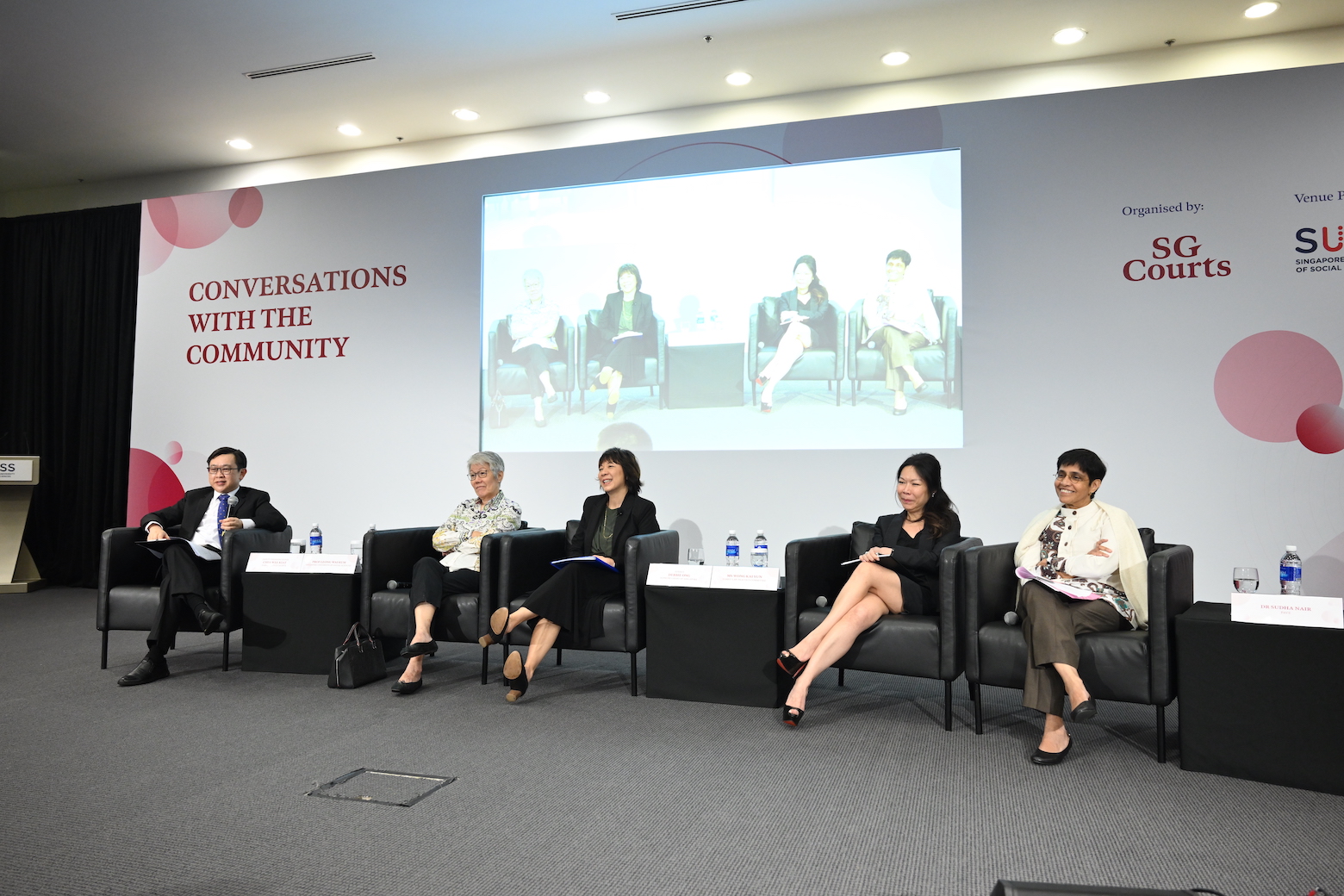BRANDED CONTENT
Hope for less contentious divorce under Family Justice Courts approach of therapeutic justice
The focus is for parties in family disputes to keep an open mind and work together to cultivate the best solutions for the benefit of all family members

With a therapeutic justice system, the court will be “a place for problem-solving and resolution, rather than a battlefield”, said Justice Debbie Ong.
PHOTO: GETTY IMAGES
Breaking up is hard to do. And when it ends up in court, it can be messy – even ugly.
The challenge for the courts: How to be fair when disputes arise over custody or the division of assets between spouses? How can such conflicts be resolved amicably?
Two recent cases illustrate how divorce can lead to bitter court battles:
- In 2021, a mother accused her former husband of abuse against their two teenage children with no proper evidence. She pursued legal actions, including filing for a personal protection order and an appeal, and involved the children in court proceedings as witnesses. Her suspended one-week jail sentence for contempt of court included conditions to comply with care and access orders. The appeal resulted in her being ordered to pay $15,000 in costs to the former husband.
- In 2018, the hearing for ancillary matters (such as child custody and the division of matrimonial assets) for a case took place some 20 months after an interim judgment for divorce was granted, as parties made various requests for disclosure against each other during that period. At least 41 affidavits (written statements under oath) were filed. The court ruled that both parties are entitled to half of the pool of matrimonial assets each.
In handling such cases, Singapore’s Family Justice Courts (FJC) take a “broad brush” approach that “eschews conduct that is petty and calculative”, said Judge of the Appellate Division Debbie Ong, who was the Presiding Judge of FJC from October 2017 to September 2023.
She was speaking at a Singapore Courts event on Nov 16 titled “Conversations with the Community”, an engagement series that brings together leaders from the judiciary, academia and legal sectors to forge multi-sector collaboration.
Justice Ong explained that a therapeutic justice system puts in place the essential legal structure and resources that will ensure therapeutic, helpful effects for the family, and support it in moving forward positively.
“In family proceedings, the court looks ahead to support the family in recasting their future; it exhorts parties not to look back at the past to lay blame or relive their hurt or pain, but to let go and focus on building a positive future despite the breakdown,” Justice Ong added.
“In this system, the court will be a place for problem-solving and resolution, rather than a battlefield.”
She was joined by a panel of family law experts, including Ms Wong Kai Yun, co-chair of the Law Society’s Family Law Practice Committee; Dr Sudha Nair, executive director of family violence specialist centre Pave; and law professor Leong Wai Kum from the Singapore University of Social Sciences (SUSS).
Moderated by FJC Deputy Presiding Judge Chia Wee Kiat, the panel discussed the need for therapeutic justice in family proceedings, and its implications for Singapore society.

From left: FJC Deputy Presiding Judge Chia Wee Kiat, SUSS law professor Leong Wai Kum, Judge of the Appellate Division Debbie Ong, family lawyer Wong Kai Yun, and veteran social worker Sudha Nair.
PHOTO: SINGAPORE COURTS
The courts’ focus on healing families means those undergoing family proceedings experience a different process from criminal or civil cases.
In divorce cases, for example, families may be connected with social service agencies to receive counselling. This helps them work through difficulties in taking responsibility, and “deal with all the angst”, said Dr Nair.
“We can start early by telling people that there's nothing wrong with getting help,” she added. “The social services should be looking at how to get (families) to cope with issues before they get out of hand. Because it's when it gets out of hand that it comes to the court.”
But even when cases are argued, judges now adopt a problem-solving focus, rather than allow parties to escalate legal tussles. “Therapeutic justice is learning to be a softer adversary of your spouse in court, and learning to always prioritise the well-being of your child, even above your own selfish well-being,” said Prof Leong.
How can therapeutic justice help families achieve positive outcomes? Watch the video below for the highlights of the second session of Conversations with the Community.
This has also seen lawyers change their approach with clients, Ms Wong observed. “Family lawyers are now expected to be mediation advocates or settlement advocates… It's quite common for us to call each other (and ask): Is it possible to do our own mediation or roundtable even before filing (court papers)?
“So that (adversarial) culture has changed, even within the last five years.”
With this paradigm shift, one key priority is equipping lawyers to help families appreciate therapeutic justice. “Quite commonly, our clients will not come to terms with that advice,” said Ms Wong, pointing to new skills required to educate and persuade clients not to jump directly to an expensive legal battle.
Prof Leong added that she shapes her students’ perspectives by reminding them that when they become family lawyers, they will see clients “at their absolute worst”.
“They are angry, they are hurt, and so on,” she said. “But 10 years after the divorce proceedings are over, they would thank you if you had advised them to be a kinder, gentler person, so that they can still hold their heads up high when they (say to) their now-grown children: I behaved as well as I could, and I didn't fight tooth and nail just to try to get 0.5 per cent more.”
More on Singapore’s judiciary
- Access for all: Find legal processes and terms confusing? Navigating legal procedures is now simpler, thanks to digital tools and streamlined processes.
- Simplified language: Terms such as “ex parte” and “leave of court” will be replaced with “without notice” and “permission of the court” respectively at the Family Justice Courts, so they can be easily understood by the public.
- Sustainable outcomes: To help families move on from a divorce, the Family Justice Reform Act – passed in Parliament in May – will provide a stronger deterrence against breaches of maintenance orders.
Lending a hand to avoid a bitter end
Here’s how a holistic variety of therapeutic justice initiatives help families resolve disputes amicably.
Heal
- Amicable litigation
The FJC adopts a problem-solving approach so that even when litigation is required, family disputes can be resolved amicably. If couples fail to reach an agreement on financial and childcare issues, lawyers and judges focus on addressing needs and issues, ensuring cases do not drag on due to unreasonable positions fuelled by emotion.
- Solution-focus
Instead of pitting parties against each other, most cases begin with counselling and mediation. For longer-term support on co-parenting and coping with conflict, families may be referred to counselling and community services by government agencies, voluntary welfare organisations and companies.
- Empathetic lawyers
Family lawyers undergo voluntary training in collaborative law, mediation and interpersonal communication – including how to calm emotional clients – to help parties reach a fair and amicable settlement. Lawyers advise clients not to stoke further conflict or be petty about the division of assets, but create long-term solutions for the family after the divorce.
- Therapeutic judgments
Judges receive specialised training in therapeutic justice from local and international trainers from various fields. The Family Justice Reform Bill – passed in Parliament in May – will give judges more control over proceedings, such as the ability to prevent vulnerable victims from being questioned in an overly intimidating way, or spouses from filing unnecessary rounds of documents that will increase legal costs and negatively affect their children.
- Holistic outcomes
To enable parents to cooperate in raising their children even after divorce, judgments aim to reach mutually workable and sustainable living and financial arrangements for all. This enables the family to adjust to their new lives, preserve healthier relationships and offers a positive future, particularly for the children.
Help
- Streamlined process
In recent years, the FJC has launched a suite of initiatives to make family justice more accessible and less painful. For example, a simplified track for divorce encourages spouses towards amicable negotiations. A review of the processes, the language used and more, is also currently underway.
- Specialist case teams
Suitable cases are assigned not just to a judge, but a multi-disciplinary team comprising a judge, judge mediator and family court specialists. This team aims to help families seek a holistic outcome before matters escalate.
Hope
- …for youth
Therapeutic justice can benefit youth offenders. The FJC’s experience will be used in the Youth Courts to enhance rehabilitation, protection, and other problem-solving approaches for youth in criminal proceedings. For example, judges discuss cases with panel advisers and court family specialists, including psychology and social science experts.
- …for civil cases
Therapeutic justice can also be applied to civil cases where parties have a long-term relationship or must work together after litigation ends. For example, lawsuits between friends over failed businesses, or legal tussles between adult siblings over property, can benefit from an approach that emphasises mediation and solutions for the future.
The next session on “Redefining Access to Justice – Alternatives to Trial” will be happening on Jan 24, 2024. To register your interest, email conversations@judiciary.gov.sg. Limited seats available.
In partnership with SG Courts


